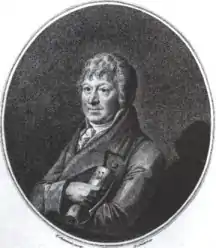Franz Krommer
Franz Krommer (Czech: František Vincenc Kramář; 27 November 1759 in Kamenice u Jihlavy – 8 January 1831 in Vienna) was a Czech composer of classical music and violinist. His 71-year lifespan began half a year after the death of George Frideric Handel and ended nearly four years after that of Ludwig van Beethoven.
Franz Krommer | |
|---|---|
 | |
| Born | 27 November 1759 |
| Died | 8 January 1831 (aged 71) |
| Nationality | Czech |
| Occupation | Composer |
Life
The main events of his life were as follows:
- From 1773 to 1776, he studied violin and organ with his uncle, Antonín Mattias Kramár, in Turany. Here he became organist along with his uncle in 1777. In 1785 he returned to Vienna as violinist in the orchestra of the duke of Styria, now in Simontornya in Hungary.
- In 1790, Krommer was named Maestro di Cappella at the Cathedral of Pécs, Hungary. He returned again to Vienna in 1795, becoming Maestro di Cappella for Duke Ignaz Fuchs in 1798.
- From 1813 (and from 1818, Kapellmeister, according to the HOASM biography) until his death in 1831, Krommer succeeded Leopold Kozeluch as composer for the Imperial Court of Austria.
He may have been Kapellmeister as early as 1814.[1]
Compositions
His output was prolific, with at least three hundred published compositions in at least 110 opus numbers including at least 9 symphonies, seventy string quartets and many others for winds and strings, about fifteen string quintets[2] and much sonorous, idiomatic and at times powerful music for wind ensemble, for which he is best known today.
Further reading
- Padrta, Karel. Franz Krommer (1759-1831); Thematischer Katalog seiner musikalischen Werke. Prague: Supraphon, 1997. 425 pp. ISBN 80-7058-388-6 (pbk.)
- Zouhar, Zdenek. Frantisek Vincenc Kramar : 1759-1959 : vyberova bibliografie. Brno: Universitní Knihovna, 1959.
- Occasionally a system of classification of Krommer's works is seen in use based on Padrta's work. For example, the quintet for flute and strings opus 55 in E minor is PadK VII/3, the concerto opus 86 for flute and orchestra (also in E minor, and often played with clarinet solo) is PadK III/16. These examples are taken from the listings at a Czech radio station's website, which gives both the standard opus numbers (when available) and the newer system (Rozhlas D-Dur).
References
- Engel, Carl (October 1918). "Music We Shall Never Hear". The Musical Quarterly. 4 (4): 500–1. doi:10.1093/mq/iv.4.491. ISSN 0027-4631. JSTOR 737875. This article also shows or at least suggests that Beethoven's opinion of such music of Krommer as he heard was poor.
- "Embellishments 8: Four Viennese String Quintets". Areditions.com. Archived from the original on 2014-04-15. Retrieved 2014-04-19.